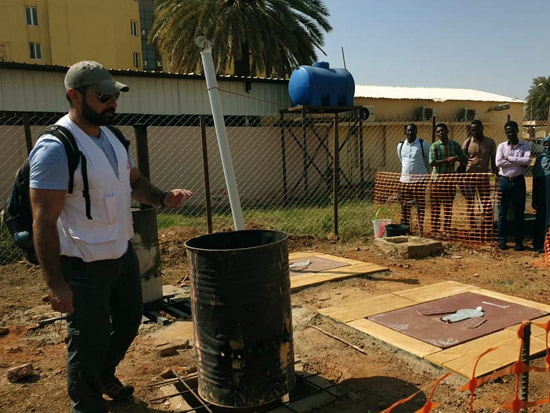 Participants learn about waste management in cholera treatment centres as part of the WHO training supported by MSF
Participants learn about waste management in cholera treatment centres as part of the WHO training supported by MSF
5 November 2019, Khartoum, Sudan -- To prevent a potential spread of the current cholera outbreak to Khartoum State – including to the country’s capital Khartoum City – and at the request of the Federal Minister of Health Dr Akram Eltom, WHO is working closely with health partners, nongovernmental organizations, and at-risk communities to ensure that suspected cases are quickly identified and responded to, and that people can effectively protect themselves from infection.
“The risk of cholera spreading is very real. If not properly managed, this could have potentially serious consequences. More than 8 million people live in Khartoum State, where the public health system is impacted by the economic crisis, recent flooding, and ongoing outbreaks of infectious diseases,” said Dr Naeema Al Gasseer, WHO Representative in Sudan.
As of 3 November, Sudan’s Ministry of Health reported 332 suspected cases of cholera, concentrated in Blue Nile and Sennar States. Two cases were confirmed in Khartoum State on 19 October.
Together with the Ministry of Health, WHO has conducted initial risk mapping in Khartoum State to identify which areas are more likely to be at increased risk of an outbreak. This will allow for more informed planning to ensure high-risk areas, including Sharq Elnil and Ombada localities, are better prepared to respond as needed.
Scaling up health capacities to detect and respond to cholera
To ensure that health facilities and cholera treatment centres in Khartoum State are equipped to diagnose and treat suspected patients, WHO has delivered cholera medicines and supplies sufficient for 400 severely dehydrated patients, and 500 rapid diagnostic tests used for immediate detection and screening of cholera patients in health facilities.
WHO is also supporting the establishing of 2 cholera treatment centres in Ombada and Bahri localities by providing additional cholera medicines, medical supplies, and rapid diagnostic tests.
To strengthen disease surveillance in Khartoum State, WHO, with the support of MSF, is providing refresher training for 271 health staff and paramedics from all 7 localities on cholera detection and management. An additional 35 health staff are being trained to form rapid response teams who will be the first to respond to suspected cases at locality level.
Ensuring communities are aware of prevention and treatment actions
“A key aspect of preventing and controlling cholera is how well at-risk communities are able to protect themselves by drinking safe water, properly handling food, avoiding defecation in open areas, handwashing, and knowing what to do when they see the first signs of infection,” said Dr Al Gasseer.
WHO and the Khartoum State Ministry of Health are working with more than 1700 male and female health promoters and volunteers who will play a critical role in raising awareness among communities on cholera, hygiene practices, and environmental health, as well as linking communities with available health services and involving them more in health planning activities.
WHO’s work to protect people from cholera in Sudan is made possible through the Sudan Humanitarian Fund.
For more information:
Inas Hamam
Communications officer
WHO Regional Office


